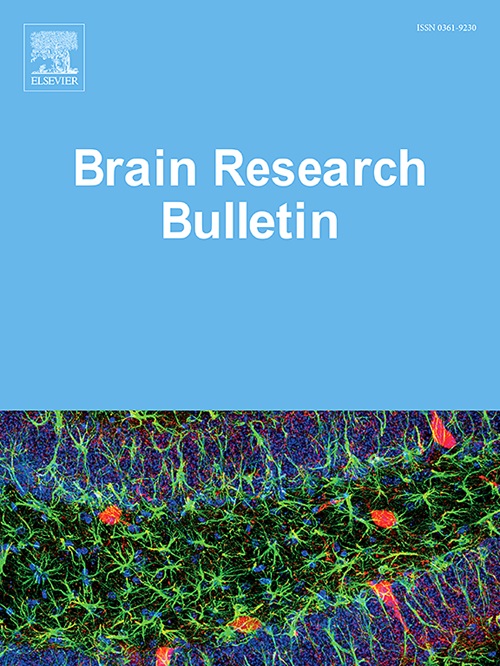来自骨髓间充质干细胞的外泌体阻止lps诱导的抑郁样行为。
IF 3.7
3区 医学
Q2 NEUROSCIENCES
引用次数: 0
摘要
重度抑郁症(MDD)是一种多方面的精神障碍,其特征是一系列显著和持续的情绪低落症状。其病因涉及遗传和环境因素。此外,炎症过程在抑郁症的病理生理中起着至关重要的作用。来源于骨髓间充质干细胞(BMSCs)的外泌体在减少促炎细胞因子方面具有显著作用。然而,关于外泌体是否可以预防lps诱导的抑郁症的发生的研究有限。本研究旨在探讨骨髓间质干细胞来源的外泌体在脂多糖诱导的抑郁症中的作用并探讨其潜在机制。我们通过尾静脉给药lps诱导的抑郁小鼠外泌体,并评估其对抑郁样行为的影响。我们的研究结果表明,四次外泌体注射(200µl,浓度为1.4×10¹¹颗粒/ml,每三天给药)可以显著预防lps诱导的抑郁症小鼠的抑郁样行为。进一步分析显示,外泌体处理降低了促炎细胞因子(IL-1β、IL-6、TNF-α)的水平,增加了抗炎细胞因子IL-10的水平。此外,外泌体处理显著降低了lps处理小鼠中枢和外周神经系统的氧化应激。此外,我们的数据表明,外泌体处理增加了LPS小鼠海马中的星形胶质细胞增殖和神经发生。总之,我们的研究结果表明,bmsc来源的外泌体在lps诱导的抑郁症小鼠中具有抗抑郁作用,这为重度抑郁症(MDD)的治疗提供了一个潜在的新靶点。本文章由计算机程序翻译,如有差异,请以英文原文为准。
Exosome derived from bone marrow derived mesenchymal stem cells prevents LPS-induced depressive like behaviors
Major depressive disorder (MDD) is a multifaceted mental disorder marked by a spectrum of significant and persistent low mood symptoms. Its etiology involves genetic and environmental factors. In addition, the inflammatory process plays a crucial role in the pathophysiology of depression. Exosomes derived from bone marrow mesenchymal stem cells (BMSCs) have demonstrated significant effects in reducing proinflammatory cytokines. However, there is limited research on whether exosomes can prevent the occurrence of LPS-induced depression. This study aimed to investigate the role of BMSC-derived exosomes in LPS-induced depression and explore the underlying mechanisms. We administered exosomes to LPS-induced depression mice via the caudal vein and evaluated their effects on depressive-like behaviors. Our findings indicate that four injections of exosomes (200 µl at a concentration of 1.4 ×10 ¹¹ particles/mL, administered every three days) significantly prevented depressive-like behaviors in LPS-induced depression mice. Further analyses revealed that exosome treatment reduced levels of pro-inflammatory cytokines (IL-1β, IL-6, TNF-α) and increased anti-inflammatory cytokine IL-10. Additionally, exosome treatment markedly reduced oxidative stress in both the central and peripheral nervous systems of LPS-treated mice. Moreover, our data suggest that exosome treatment increased astrocyte proliferation and neurogenesis in the hippocampus of LPS mice. In summary, our results demonstrate the antidepressant effects of BMSC-derived exosomes in LPS-induced depression mice, suggesting a potential new therapeutic target for major depressive disorder (MDD).
求助全文
通过发布文献求助,成功后即可免费获取论文全文。
去求助
来源期刊

Brain Research Bulletin
医学-神经科学
CiteScore
6.90
自引率
2.60%
发文量
253
审稿时长
67 days
期刊介绍:
The Brain Research Bulletin (BRB) aims to publish novel work that advances our knowledge of molecular and cellular mechanisms that underlie neural network properties associated with behavior, cognition and other brain functions during neurodevelopment and in the adult. Although clinical research is out of the Journal''s scope, the BRB also aims to publish translation research that provides insight into biological mechanisms and processes associated with neurodegeneration mechanisms, neurological diseases and neuropsychiatric disorders. The Journal is especially interested in research using novel methodologies, such as optogenetics, multielectrode array recordings and life imaging in wild-type and genetically-modified animal models, with the goal to advance our understanding of how neurons, glia and networks function in vivo.
 求助内容:
求助内容: 应助结果提醒方式:
应助结果提醒方式:


